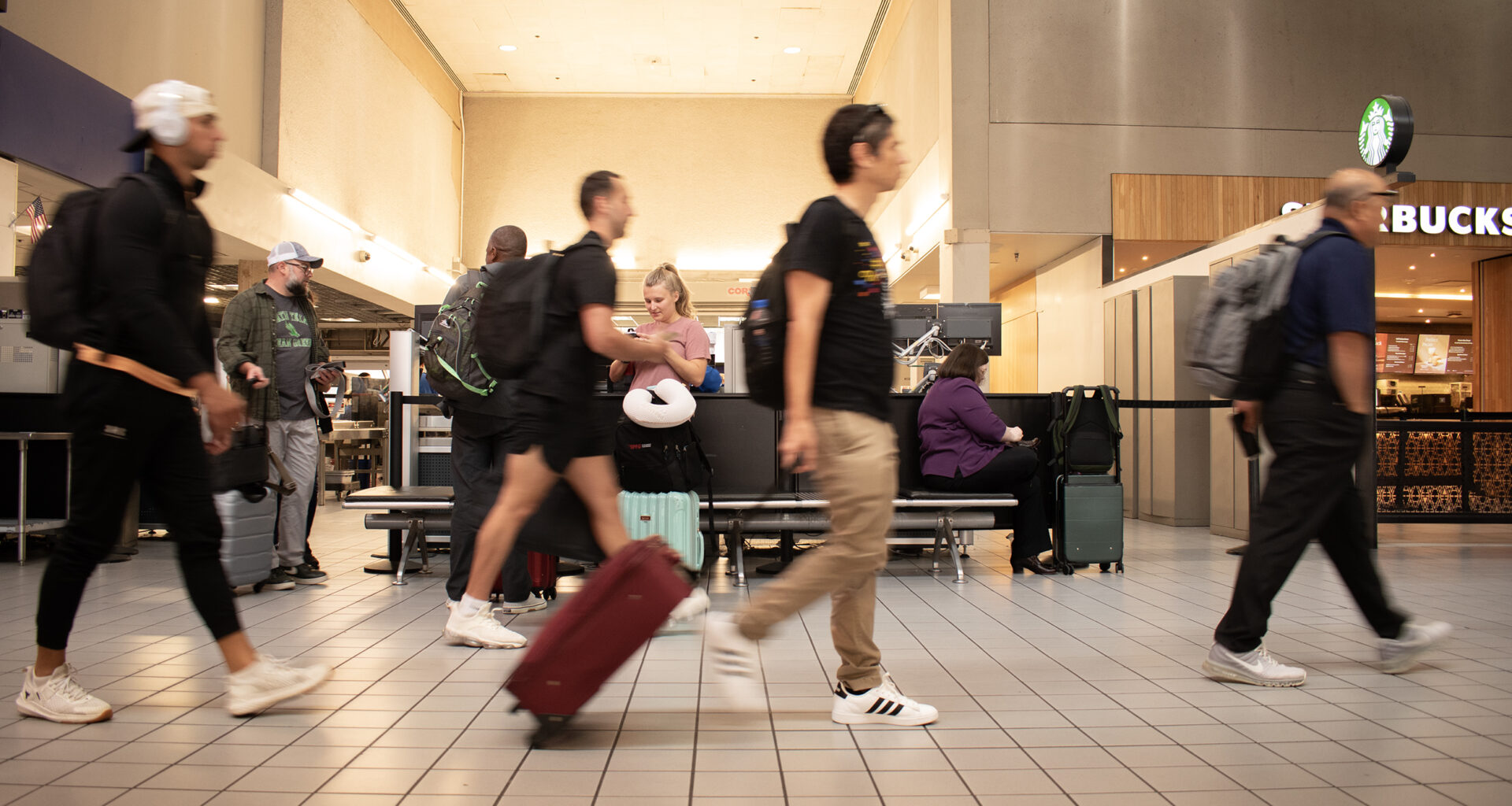Cindy McCoy fielded phone calls from panicked travelers for weeks.
The travel manager at Fort Worth-based Gulliver’s Travel said the agency’s customers worried about their holiday plans being disrupted by the 43-day government shutdown, the longest in U.S. history.
“There was a lot of anxiety and a lot of phone calls,” she said. “We’re just glad the shutdown ended and eased a bunch of concerns.”
Operations at DFW Airport, the world’s third-busiest airport, are recovering from the lingering effects of the government shutdown as it prepares for an influx of holiday season travelers. Last year, an estimated 3.1 million travelers visited the airport during the Thanksgiving travel season.
Just one flight was canceled and 52 others were delayed on Monday. Last week, 31 flights — about 2% of all DFW Airport traffic — were canceled Thursday, and 93 flights, or 8%, were delayed, according to FlightAware.
Air travel operations across the nation are taking off again after the shutdown — the longest in U.S. history — caused numerous domestic flight cancellations and delays.
Officials said about 46 U.S. flights were canceled Monday and another 1,672 were delayed. The reductions stemmed from a Nov. 7 emergency order that lessened domestic air travel by 6%. That order was reduced to 3% on Saturday and canceled at 6 a.m. Monday.
Air travel rebounded quickly following last week’s cancellations of more than 1,000 U.S. flights and nearly 2,500 additional flights delayed on Thursday. The order affected 40 commercial airports, including DFW Airport and Dallas Love Field.
With robust Thanksgiving travel on the horizon, the U.S. Department of Transportation worked with the Federal Aviation Administration to assess the system. The emergency order was canceled after reviews of safety trends and a steady decline of trigger events involving staffing. A trigger event is something that activates a safety protocol, typically in air traffic control, to reduce workload when there are not enough controllers. During the shutdown, air traffic controllers worked weeks without pay before President Donald Trump signed a funding bill Wednesday night. Paychecks missed will be paid retroactively.
In a news release, U.S. Transportation Secretary Sean Duffy said air traffic controllers have returned to their posts and normal operations can resume. Improvement was noted over the weekend as six staffing triggers were noted Friday, eight on Saturday and one on Sunday. A record high of 81 staffing triggers were recorded on Nov. 8.
“Now we can refocus our efforts on surging controller hiring and building the brand new, state of the art air traffic control system the American people deserve,” Duffy said in a statement.
In a news release, FAA administrator Bryan Bedford said he was “grateful for the hard work of the FAA safety and operations teams and for their focus on the safety of the traveling public.”
Officials at Fort Worth-based American Airlines — DFW’s largest carrier — had been working to take care of its massive customer base.
American CEO Robert Isom said he was proud of how American’s team members responded to the shutdown and remains grateful for federal aviation workers who faced challenging conditions for weeks without pay.
“Our goal throughout this has remained unchanged: take care of our customers and limit disruption to their travel plans as much as possible,” Isom said. “We’re ready for business and looking forward to serving customers with a full schedule especially in advance of the Thanksgiving and year-end holidays.”
Waco-based economist Ray Perryman said he doesn’t have an estimate on the financial impact of the shutdown on U.S. airports and carriers, but could look at data as normal DFW operations resume.
Across the county, the effects of the shutdown could reach at least $10 billion, he told KXXV.
Holiday travelers
Nearly 82 million Americans are expected to travel around the Thanksgiving holiday, according to a news release from AAA.
Most travelers — nearly 73 million — will use vehicles to reach their destination between Nov. 25 and Dec. 1. More than 6 million will travel by air, up slightly from 2024, according to AAA.
“Thanksgiving travel numbers are always impressive because this holiday has become synonymous with heading out of town to spend time with loved ones,” Stacey Barber, vice president of AAA Travel Services, said in a statement. “People are willing to brave the crowds and make last-minute adjustments to their plans to make lifelong memories, whether it’s visiting extended family or meeting up with friends.”
McCoy said agents at the 30-year-old Gulliver’s Travel advise clients to get to DFW Airport at least 2½ to 3 hours before their flight departs. With road construction underway at the airport, she said it’s important to allow more time to reach terminals.
Travelers can also take TEXRail trains to the airport to avoid traffic tie ups. Trinity Metro stations offer long-term parking for travelers.
McCoy said Texans are increasingly making their travel plans early. Customers once booked their plans about 4 to 7 months in advance but now do so 9 to 11 months early.
“We stay busy all year long,” she said.
For those planning to drive to their destination, Texas motorists can expect to pay about the same price for gasoline as last year.
The state average price for a gallon of regular unleaded gasoline is $2.638, up slightly from $2.655 recorded at the same time last year, according to AAA.
Eric E. Garcia is a senior business reporter at the Fort Worth Report. Contact him at eric.garcia@fortworthreport.org.
News decisions are made independently of our board members and financial supporters. Read more about our editorial independence policy here.
Related
Fort Worth Report is certified by the Journalism Trust Initiative for adhering to standards for ethical journalism.
Republish This Story
Republishing is free for noncommercial entities. Commercial entities are prohibited without a licensing agreement. Contact us for details.
